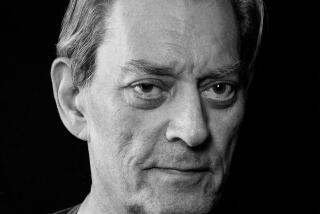Books : He Wasn’t ‘Born’ Until He Turned 22
- Share via
Moon Palace by Paul Auster (Viking: $18.95; 286 pages)
Marco Fogg’s life began, he tells us, roughly at the point where “Moon Palace” ends. The narrator’s “birth” takes place at the age of 22, after he uses up five pairs of boots walking across the Southwest desert, arrives at Laguna Beach and sees the moon rise over the Pacific.
All that goes before--the novel itself--is prenatal, in other words. It feels a bit that way, like an unsubstantial reverie of life before birth.
A man doesn’t properly begin to live, according to a drastic simplification of one of Freud’s tenets, until he has sought his father out and symbolically killed him. “Moon Palace’s” potential exuberance is constrained and sometimes neutralized by the tenet’s excessive control.
In fact, the adventures that Marco relates revolve about locating--through the broadest of coincidences--not only his father but his grandfather, as well. And then, lovingly and with no hard feelings on either side, killing them both by approximate mischance.
When the book begins, Marco is literally starving himself from a lack of roots. His mother was run over by a bus when he was little and died without telling him who his father was. Her brother, Victor, the amiable clarinetist who brought him up, dies in Marco’s senior year at Columbia University.
Marco’s only inheritance is his uncle’s library. He piles the books in furniture stacks--a bed stack, a table stack, a chair stack. He sells them off in threes and fours in order to eat; when they are gone he goes hungry. Not knowing who he is, he has nobody to work for or feed.
Book by Design
A friend finds him living in Central Park, ill with pneumonia after being drenched in a rainstorm. Finding him is a coincidence--so, as we will see, is the near-death by drenching--and there will be others. “Moon Palace” is a book by design, a fable-like design that is both mythical and laid-back.
Food, shelter and the love of a young woman, Kitty, revive Marco enough so that he answers an employment ad as companion to an old man who can’t walk. It is not really a step outside of himself. It will turn out later--another coincidence--that Thomas Effing is his grandfather.
Effing, well-to-do and irascible, crippled and blind, has Marco read to him and take him for long walks. He is abusive but tender. He tells Marco his life story; a wildly variegated account of starting as a painter, traveling to the Far West, being abandoned by a treacherous guide in the desert, living as a hermit, killing three bandits, using their cache as a grubstake to make a fortune, and more.
It is colorful and seemingly larger than life. It is also foreshortened and inert. The extravagant incident and the author’s highly controlled sensibility make a curious post-modern match. It is the kind of match we find, for example, in Doctorow: fantasy without belief.
Effing catches pneumonia himself, and dies of it, after one last errand. He has had Marco wheel him through New York so he can distribute $50 bills, and they are caught in a shower. Marco did not intend the death; nevertheless, he let himself be its instrument.
Similarly, he does not intend the death of Effing’s son, Solomon. The latter looks Marco up and enlists him as his confidant. Finally, Marco learns that Solomon, as a professor, had seduced his mother when she was his student. She then disappeared, frustrating Solomon’s efforts to trace her, and subsequently gave birth to Marco.
The discovery enrages the young man. Retreating before his fury, Solomon, who is immensely fat, stumbles and breaks his back. Previously, he had given Marco a novel in which a whole series of fathers and sons search out, torment and kill each other.
Arbitrary Exercise
By this time, the reader may feel put-upon. Auster’s cyclical father-son chase becomes an arbitrary exercise; a clothesline on which Marco’s musings, conceits and adventures are hung out to dry.
Marco is lively enough, and appealingly astringent. He tells of his outsize father and grandfather with a kind of whimsical dismay. He is not particularly memorable in himself, however. He has not been born yet.
More to Read
Sign up for our Book Club newsletter
Get the latest news, events and more from the Los Angeles Times Book Club, and help us get L.A. reading and talking.
You may occasionally receive promotional content from the Los Angeles Times.








